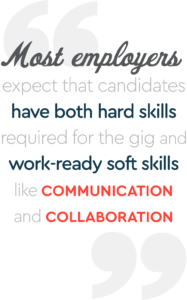How Career Services Helps Students Pursue Careers After Graduating

It’s crucial for college students to be strategic about the first job they take after graduating. Over 40 percent of college students take jobs that don’t require a degree, according to CNBC, and taking such a job can have a serious impact on the rest of their careers. Those who take a job that doesn’t require a degree are five times more likely to be in a similar position five years later than those who use their college degrees right away.
And 10 years later, about 75 percent of graduates who take jobs that don’t require a degree will be in a similar job and earning about $10,000 less per year than their colleagues who took jobs requiring degrees early on. In fact, more than one in five college graduates are still working in jobs that don’t require a degree a decade after graduating.
Employers now have increased expectations, and it can be difficult for college graduates to meet these demands, even for entry-level jobs. Most employers expect that candidates have both the hard skills required for the gig and work-ready soft skills like communication and collaboration.
Part of the reason college students aren’t prepared for job interviews or aren’t knowledgeable about the soft skills required is that they have not fully prepared by visiting their college or university’s career center. In fact, about 40 percent of undergraduate students never visit their Career Services department.
Role of Career Services
Colleges’ and universities’ Career Services centers provide a diverse range of services to help students or even alumni meet the goals of pursuing careers after graduating.
1 | CHOOSE A CAREER
For students that are still not sure what they want to do or are leaning towards a particular industry but need more information, the Career Services department can help them choose a career, using self-assessment tools to examine values, personality, interests, and abilities and determine which career options are most suitable for them. For students just starting college, the Career Services Center can be a great tool for deciding which academic major will help them meet their career goals.
2 | PREPARE FOR INTERVIEWS
One of the largest goals of a Career Services center is to help college students prepare for interviews or interactions with companies or organizations, whether this means formally in an office setting or at an upcoming career fair. When students are preparing to interview for their first job, they need help writing their resumes and cover letters, revamping their soft skills like communication and working on interview skills like body movements and eliminating filler words, like “um.” They can also help students learn how to present themselves during interviews and provide mock interview questions to practice their soft skills.
3 | RECRUITING SERVICES
Career centers tend to host job fairs, where employers visit campus to recruit graduating students. They often keep student files with letters of recommendation from faculty to forward to potential employers and graduate schools. In addition to job fairs, career centers also keep job portals with employment and internship listings, which students can access to apply to jobs and internships on their own time.
4 | NETWORKING
Career centers often help set students up with networking events and opportunities where they can connect with professionals in their prospective career or industry. College or university alumni usually want to help connect students with job opportunities and are available to provide career advice. Career centers can help prepare students for these networking events, as well as job interviews and job fairs.
5 | UP-TO-DATE TRENDS
Career Services departments are often responsible for staying up to date on employer hiring processes and trends. Current trends include assessments or tests for personality or company fit, as well as text message touchpoints during the interview process. They also need to prepare students to adapt to these trends during interview prep. Fit tests are often a way for companies or organizations to test graduating students’ soft skills, so career centers should ensure that students are aware of the required soft skills for their position or industry during interview prep.
Interested in learning more about interviewstream can help your career center assist students in pursuing their dream careers? Schedule a demo with us today!
About The Author
Esteban Gomez is a marketing consultant with interviewstream. He loves learning and has a passion for traveling, having visited many countries including China, Colombia, Italy, and Peru.
